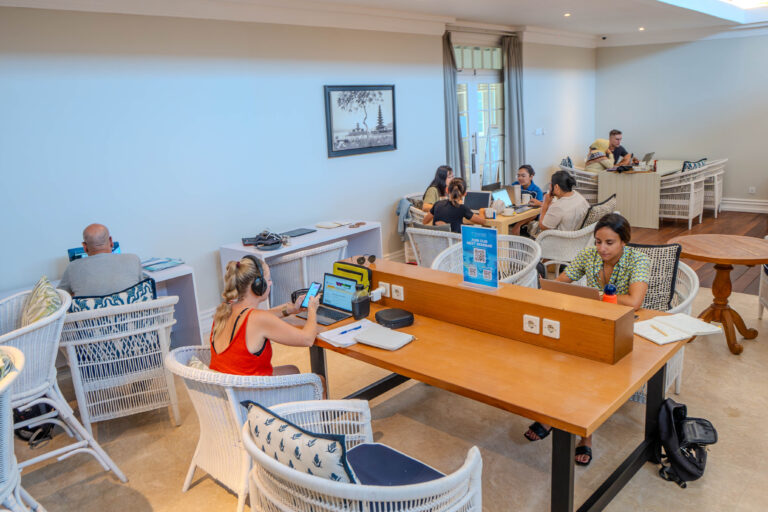Bali is one of the world’s most beloved travel destinations, known for its stunning beaches, vibrant culture, and warm hospitality.
But before you pack your bags, it’s important to know some key facts about Bali’s customs, health precautions, visa rules, and local laws.
This guide will help you navigate everything from avoiding Bali Belly to respecting religious sites, so your trip can be safe, smooth, and unforgettable.
Local Culture And Customs
Balinese culture is laid-back but deeply rooted in Hindu traditions and community spirit. People are friendly and welcoming, so a simple greeting like “Selamat pagi” (good morning) in Bahasa Indonesia goes a long way. While it’s fine to dress casually on the beach, when visiting villages or temples, it’s polite to cover your shoulders and knees to show respect.
You’ll see plenty of ceremonies and offerings during your stay—these are an important part of daily life. Observing quietly and not interrupting helps you enjoy these cultural moments without offending locals.
Loud or rude behaviour isn’t typical in Bali and is best avoided to keep good vibes. Overall, being respectful, open, and curious about the local way of life will make your trip more enjoyable and memorable.
Visiting Religious Sites And Temples
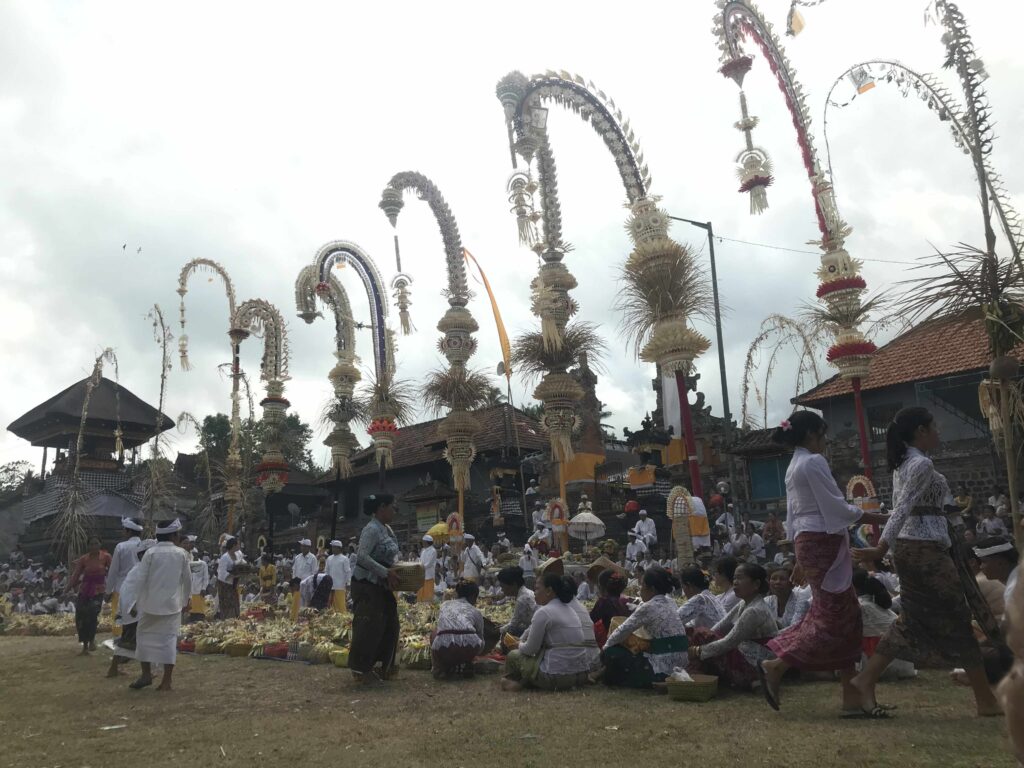
Bali’s temples are beautiful and meaningful places that play a big role in local life. Popular spots like Uluwatu Temple or those around central Bali attract lots of visitors. When you visit, dress modestly by covering your shoulders and knees — many temples offer sarongs if you don’t have one.
Be sure to follow and rules and obey signs banning photography. It’s also important to step carefully and not disturb the small offerings (called canang sari) left around the temple grounds.
Ceremonies happen often, sometimes early in the morning or at sunset. If you come across one, it’s best to watch quietly and respectfully without interrupting.
Visiting these temples gives a real glimpse into Bali’s spiritual side, and being thoughtful about your behaviour will help you enjoy the experience and respect the local culture.
Nyepi

Nyepi is Bali’s annual Day of Silence, usually in March. It marks the Balinese New Year and comes with a full 24 hours of quiet—no flights, no traffic, no lights, and no outdoor activity.
Tourists must stay inside their hotel room or accommodation for the day. That means no going out, no loud music, and no lights visible from outside. It’s a unique cultural moment, but you’ll want to plan ahead and stock up on essentials.
If you’re in Bali during Nyepi, embrace the calm; it’s unlike anything else.
Health And Safety
When visiting Bali, staying safe and healthy means planning ahead. Bring enough prescription medications for your trip, keeping them in their original packaging to avoid customs issues. Carry a small first aid kit for minor injuries or ailments.
Bali has good medical facilities in major areas like Nusa Dua and central Bali, but in rural spots, access can be limited. If you get sick or injured, don’t hesitate to seek medical advice early.
Travel insurance that covers medical treatment and emergencies is essential. It ensures you get the care you need without unexpected costs.
Also, be mindful of common safety risks like traffic and stray dogs. Always use reputable taxi drivers or transport services, and avoid risky behaviour on busy roads.
By preparing smartly and staying aware, you’ll have a much smoother and safer Bali trip.
How To Avoid Bali Belly

Bali Belly is usually caused by consuming contaminated food or water. To minimise your risk, drink bottled water and avoid ice cubes unless you’re certain they’re safe. Whatever you do, do NOT drink tap water in Bali.
Choose freshly cooked meals and favour busy eateries where food turnover is high. Avoid raw or unpeeled fruits and vegetables unless you prepare them yourself. Regularly washing your hands or using hand sanitiser, especially before eating, can also help protect you from germs.
If you do get Bali Belly, focus on staying well hydrated with oral rehydration solutions or plenty of bottled water. Avoid heavy, oily, or spicy foods until your stomach settles. Over-the-counter remedies like activated charcoal or anti-diarrheal medicine can help, but if symptoms worsen or last more than a couple of days, seek a doctor promptly.
Be Sure To Have A Valid Travel Insurance Policy
Travel insurance is essential when visiting Bali. It covers unexpected medical emergencies, treatment costs, and other travel-related mishaps like lost belongings or trip cancellations. Choose a policy that includes medical evacuation coverage, as some remote areas may require transfers to larger hospitals.
Having comprehensive insurance ensures peace of mind and helps avoid costly surprises during your trip.
Scooter Hire
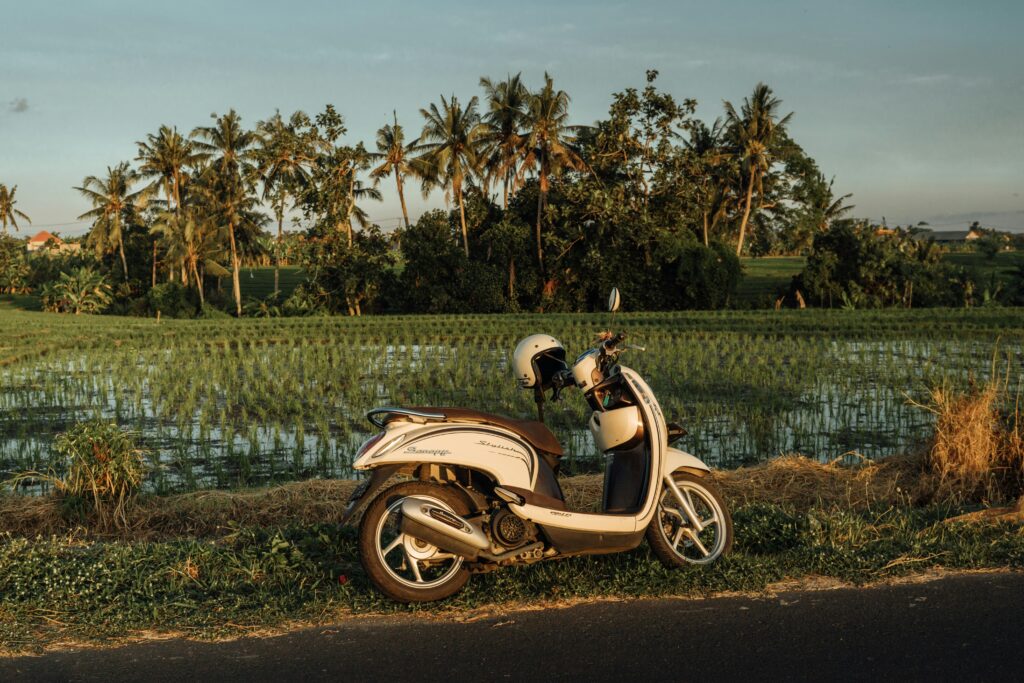
While renting scooters is popular among tourists for getting around, it carries significant risks.
Traffic in Bali can be chaotic, and many visitors underestimate local driving conditions. It’s unlikely that you’ll be legal to ride, and this could cause you problems with the law, as well as insurance in the event of an accident.
If you insist on renting a scooter, always wear a helmet, ensure you have a valid international driver’s license, and drive cautiously.
For those unfamiliar with scooter riding or Bali’s traffic, it’s often safer to rely on taxis, ride-hailing apps, or organised tours to avoid accidents and injuries.
Visa And Entry Requirements
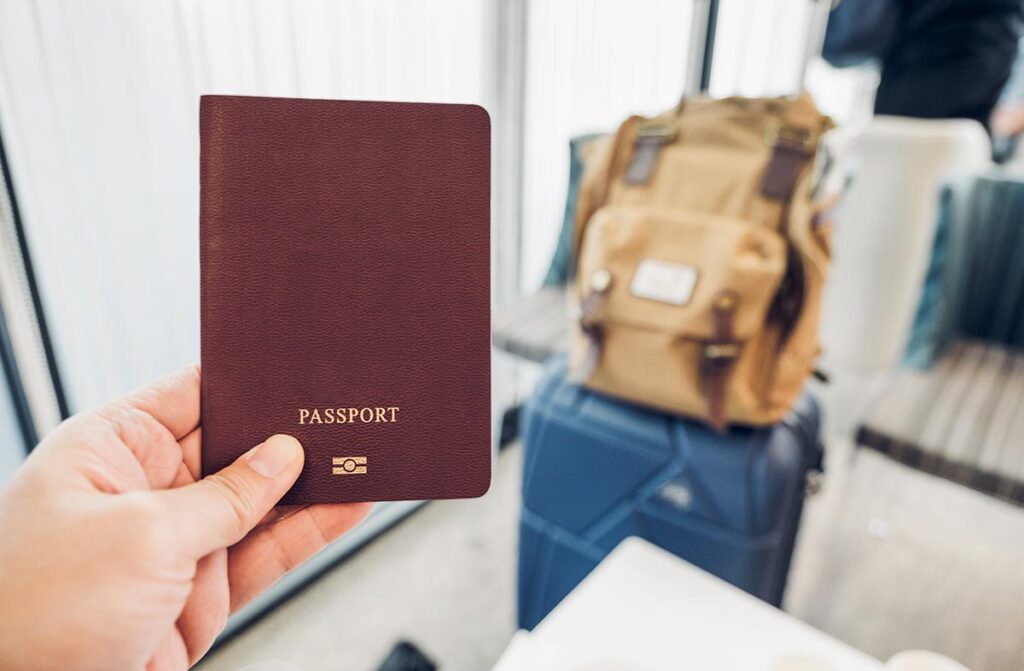
Before entering Bali, it’s important to understand the visa options and entry rules that apply to your nationality. Most travellers, including Australians, can obtain a Visa on Arrival (VOA) valid for 30 days, which can be extended once for an additional 30 days.
Australians benefit from relatively straightforward entry procedures, but should always check the latest travel advisories from the Indonesian embassy before booking.
Visitors must also complete an electronic health declaration form as part of Indonesia’s current entry requirements.
Do not attempt to enter Indonesia without the correct entry requirements.
Customs Form Online
To streamline your arrival, fill out the customs form before landing. This form gathers your personal information, travel history, and health details as mandated by local authorities. Completing this ahead of time can significantly reduce wait times at immigration and customs. Once you’ve completed the form, a barcode containing your health and travel history will appear.


E-Visa
For longer stays or specific purposes, travellers can apply for a Visa prior to arrival. The e-Visa process allows you to avoid queues and ensures your visa is ready when you land. Check the official Indonesian immigration website for eligibility, application steps, and processing times.
Local Laws And Regulations

The Indonesian government has some strict laws that visitors must respect to avoid serious trouble. Drug offences carry particularly tough penalties, including lengthy jail terms and heavy fines, so steer clear of any involvement with illegal substances. If you do become mixed up in drug-related crimes, your embassy can do nothing to help you…stay away!
Respect the legal drinking age of 21 and only consume alcohol in licensed venues. Public drunkenness and disorderly behaviour can result in fines or arrest.
If stopped by local officials or police, always remain polite and cooperative. Carry a copy of your passport and visa, and avoid giving money directly to authorities—use official channels if fines apply.
Understanding and obeying the law will help ensure your trip is safe and hassle-free.
Money And Payments

When travelling in Bali, the local currency is the Indonesian Rupiah (IDR). It’s best to carry some cash for small purchases, markets, and places that don’t accept cards. Use official money changers or banks to avoid scams and check rates carefully before exchanging.
ATMs are widely available in tourist areas like Kuta, Seminyak, and Ubud, but avoid withdrawing large amounts at once to reduce risk. Always notify your bank before travelling to prevent card blocks.
It’s worth noting that, contrary to most Western countries, Indonesian ATMs give the cash first, and then the card. A common mistake is to grab the cash and walk away, forgetting the card. Be careful and don’t get caught out.
Credit and debit cards are accepted in many hotels, restaurants, and bigger shops, but always have cash handy for smaller vendors or scooter taxis.
Keep in mind that some places may charge a tourist tax or service fee—ask in advance to avoid surprises.
Getting Around
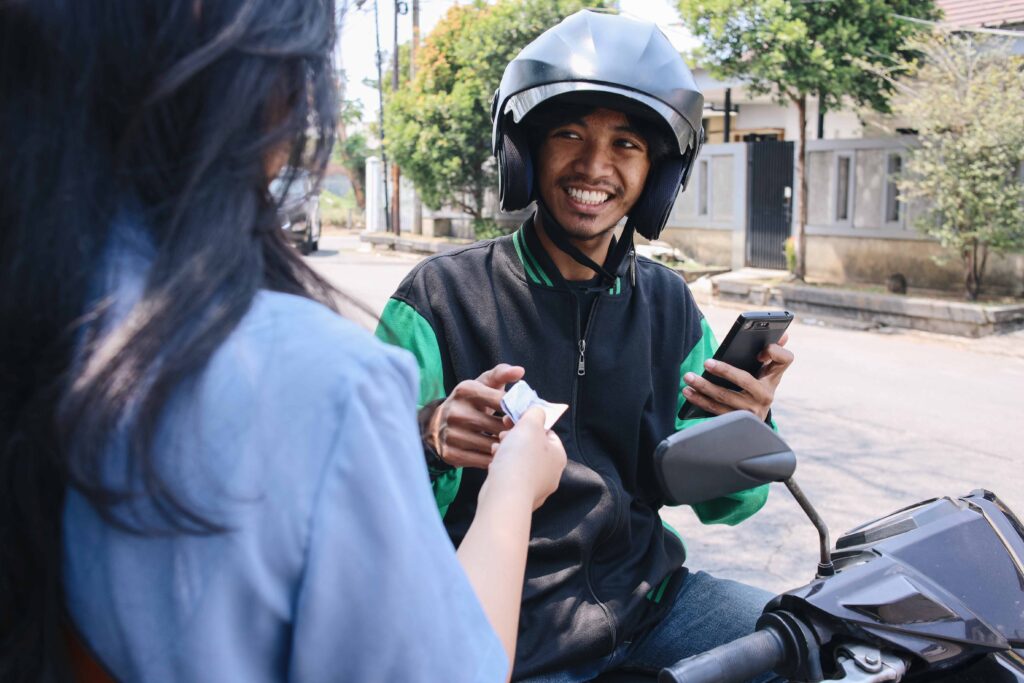
Bali’s transport options vary, so it’s good to know what works best. Using ride-hailing apps like Grab or Gojek is popular, but keep in mind you’ll need reliable mobile data to book rides and navigate. Buying a local SIM card with a good mobile data plan is easy and affordable at the airport or convenience stores, helping you stay connected throughout your Bali trip.
Public transport is limited, and although buses exist, they are often not the best option for tourists. Many visitors prefer group tours or hiring a private driver for day trips—this can be a comfortable way to see popular spots like rice terraces, waterfalls, and temples without the stress of navigating.
As mentioned earlier, we advise against hiring scooters; the roads in Bali can be very testing. Road trips by motorbike are possible for confident riders but come with risks due to busy roads and local driving styles.
Taxis, ride-hailing, and private drivers remain the safest and easiest ways to get around for most travellers.
Google Maps

Google Maps generally works well in Bali for navigation, directions, and finding nearby places like restaurants, hotels, and beach clubs. It’s also handy for checking reviews and opening hours.
However, the address system in Bali can be confusing. Many businesses have similar names or multiple listings, and duplicate pins are common. Always double-check the location—especially when booking accommodation or meeting a driver—to avoid ending up in the wrong place.
When in doubt, contact the business directly or ask a local to confirm.
Seasonal Weather Tips

Bali has two main seasons: the dry season (April to October) and the rainy or monsoon season (November to March). Most tourists prefer visiting during the dry season when there’s plenty of sunshine, perfect for beach days, hiking, and exploring.
That said, the rainy season is still a good time to visit, with fewer crowds and lush green landscapes. Just expect the odd heavy downpour, especially in the afternoons. Pack light, breathable clothing, but don’t forget a waterproof jacket or poncho.
Early mornings are often clearer, even during the wet season, so plan outdoor activities accordingly.
No matter when you visit, always check official warnings for weather-related issues, especially if you’re planning on trekking, scuba diving, or road-tripping around the island.
FAQs
Do I Need Any Vaccinations Before Visiting Bali?
The World Health Organization (WHO) recommends certain vaccines for travel to Bali, such as Hepatitis A, Typhoid, and Tetanus. However, the right vaccinations can vary depending on your health, travel plans, and how long you’re staying.
It’s best to visit your GP or a local travel doctor well before your trip. They’ll give you personalised advice based on your medical history and the areas you plan to visit.
What Is Bali Doing To Reduce Plastic Waste On The Island?
Bali, Indonesia, has been actively working to reduce plastic waste to protect its stunning beaches and environment. The local government banned single-use plastic bags in 2019, encouraging visitors and locals to bring reusable bags instead. Many hotels and restaurants have also switched to eco-friendly alternatives for packaging and utensils.
While enjoying popular dishes like nasi goreng, fried rice, or mixed rice, tourists will notice less plastic packaging and more sustainable serving options. Bali’s push toward reducing plastic waste helps keep the island cleaner and preserves its natural beauty for everyone to enjoy.
Final Thoughts On Things To Know Before Visiting Bali
Visiting Bali is an incredible experience filled with natural beauty and rich culture.
By preparing ahead—understanding local customs, health tips, visa requirements, and legal rules—you’ll enjoy a hassle-free and respectful stay.
Remember to stay curious, stay safe, and embrace all that Bali has to offer. Safe travels!






